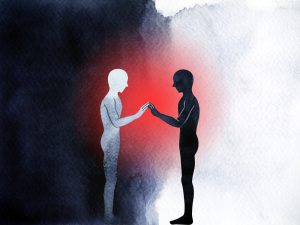Erik Erikson, a prominent psychologist, developed a psychosocial process to measure proper development of the human individual. Through a series of steps in development throughout life, he theorized that the human individual must conquer certain stages in order to develop in a healthy way. When certain stages are not properly conquered, future social and mental ramifications can occur that degrade the individual’s overall happiness.

Obviously, when certain stages were not met, a person’s development was slowed and future consequences manifested later in life. Unhappiness and a type of grief can develop when an individual does not reach certain milestones in life and this type of abstract grief exists in many individuals who have not fulfilled basic progression throughout life. Hence, we will review these the 8 phases of development proposed by Erikson and see how failure to meet these developments can lead to grief and abstract loss in a qualify of life.
Erikson’s Eight Stages
Erikson’s Eight Stages correlate with infanthood to adulthood. It transpires across a person’s complete social development from infancy to elder age and the importance within each phase to accomplish certain goals. Erikson points out that some individuals who do meet the proper goal and virtue gained can also inherit a detrimental crux that hinders development and can later manifest in life. Hence it is crucial for persons to develop certain skills and meet certain goals during different stages during development to build upon and become productive and mentally and emotionally healthy adults throughout life. Individuals who do not suffer from a variety of maladies and mishaps throughout life that force mental and emotional struggles and even regression in life. Ultimately, a very dissatisfied person can emerge at the end of life who has failed to meet many of these goals.
The first stage involves infancy from birth to 18 months. In this age, the person learns trust or mistrust. As a baby, the person is entirely dependent upon the caregiver. Good and health attachments and bonds are formed that will serve a life time if the baby is given love and attention. Trust lays the foundation and love is is the key ingredient to growth. Hope is hence instilled in the baby’s view of the world. Th When that bad care is given to a baby, poor attachments develop and the person will become mistrustful and have hard times forming healthy relationships.

The second stage involves toddlers from age 2 to 3. At this age, children will learn become more independent and learn new skills. Walking, toilet training and other new skills emerge. From this arrives autonomy or shame and doubt. A child who successfully is able to navigate autonomy successfully will become more independent but when failure occurs, doubt and shame will emerge which can haunt a child’s ability to move forward in life. It is important to develop a sense of will in the child to become more independent.
The third stage involves children ages 3 to 5. Children begin to explore and take initiative through play and assertion of of power over their world. Hence this stage is labeled initiative or guilt. If the child exerts too much attempted control and receive disapproval, the child may experience guilt. This can lead to the child not taking initiative in future endeavors. It is important during this stage to form a strong sense of purpose to move forward.
The fourth stage involves the child developing skills that foster industry over inferiority. It is critically important between ages 6 and 11 for the child to develop confidence and competence to complete tasks. Those children who receive little encouragement will fall into doubt their abilities and become less equipped to move forward in life with confidence in their goals and skills. It is hence important to build confidence within the child and help them develop basic skills to complete tasks.
Following this stage is the fifth stage that deals with adolescence and ages from 12 to 18. The primary goal is identity over role confusion. This stage looks to establish fidelity to self. During teenage years with the many biological changes, teen agers are bombarded with pressures to succeed. Peer pressure, future ambitions, and values are all challenged. It is crucial during these difficult years to form an identity of self. It is important to understand who oneself is and what one stands for. Sometimes this takes time and if not met, the person is constantly confused regarding what he or she stands for or wishes to be. It is important for parents and guardians to help their teens express themselves in a healthy way so they can find a true identity as they enter into adulthood.
Adult Stages
Unfortunately many adults grew up in broken homes and had less than ideal lives. They may never had a caring parent and may have issues of attachment or forming relationships. Some may be fearful to be on their own or try new things. They may have little faith in their skills or even who they are. This leads to a very broken person who must find a way to answer these questions before he or she can ever proceed towards a fruitful and healthy life. Many broken individuals exist because of these unconquered goals and face an uphill battle. A sense of abstract loss hovers over them in their inabilities to form healthy relationships, set healthy boundaries and take initiatives with confidence.
Without these skills it almost impossible for them to enter into sixth stage of intimacy over isolation. Individuals from the age of 19 to 40 look for a closer union with others. Healthy individuals with good attachment bonds and confidence to love oneself are able to share with others. They can share love, they can share dreams and they confidently move forward. However, those who are not able to form healthy relationships are left to further isolation and an inability to find love. This does not necessarily mean even romantic love, but any type of relationship. Relationships are critical to survival. As social creatures relationships help form one’s inter connections with the world. Many individuals suffer immense grief due to this type of isolation.

Following this state is the seventh stage of middle adulthood from 40 to 65. In this stage, the person looks to find generativity over stagnation. Individuals who have formed solid relationships and have the core abilities from childhood to be autonomous and confident are able to succeed in life during middle age. They are able to become educated, work, develop a career, and have family connections. They possess mental, spiritual and physical qualities that they are proud to possess. When middle age appears, they see themselves as caregivers to the next generation but also the previous. They are able to care and teach. However, those who have not been able to succeed due to lack of previous stage met goals, will find themselves in mid life crisis. They will fear the future, lament the past and doubt where they are going in life. This may lead to disastrous choices and foolish adventures. Some may revert to immature behaviors well below their age. This type of anxiety and grief is a displeasure about what they have become and where they currently are.
The final and eighth stage is integrity over despair. Those persons from age 65 to death will experience a sense of fulfillment or a sense of failure. Those who lived a good life and worked hard but also gave themselves time to love and live life will look back with a fond smile. They will have grown in wisdom and have much to share with others. They will know they have fought the good fight and left an overall good mark on the world. However, those who have squandered their life will feel a sense of existential dread and despair. They will see a life of mistakes and inabilities to fulfill dreams and help others. This dark despair will lead to an unhappy death with little to show for.
Stages and Grief
While much of one’s personality is molded in the formative years, others through luck or grace of God can emerge as healthy adults. Hence while there are contributing factors, one must ultimately accept accountability. Those who are able to catch up with the goals of the stages and find competence can turn the rest of their life around. Those who do not, will live a life of abstract loss and missed opportunities. Those who takes the easy road and fail to push forward will experience the pain and grief of a failed life.
Many individuals face this grief and look to find meaning in life. Grief Counselors can help direct individuals to better goals to satisfy the emptiness of an unfilled life. The only answer to this type of abstract grief that leaves the soul empty is finding meaning in life. Maslow’s Hierarchy of needs builds a foundation for basic survival but once a person’s biological needs and safety needs are met, one must have the emotional abilities to form relationships and experience love. Have the emotional abilities to find success that fuels self esteem and to mentally, emotionally and spiritually actualize one’s overall potential.

When these things lack within the human person, a sense of depression and dread blanket them. They feel useless and washed up. They feel that they have no potential or ability to love or be loved. They feel a myriad of negative emotions that chain them to a unfulfilled life. This type of abstract grief can be as far damaging as any other type of loss. It is hence important to help these individuals understand what they are lacking in their human development and enhance their confidence to develop and find the emotional ability to find happiness and meaning again.
Please also review AIHCP’s Grief Counseling Certification and see if it meets your academic and professional goals. The program is online and independent study and open to qualified professionals seeking a four year certification as a Grief Counselor.
Additional Resources
“Erik Erikson’s Stages Of Psychosocial Development”. Mcleod, S. (2023). Simple Psychology. Access here
“Erik Erikson’s Stages of Psychosocial Development Explained”. Sutton, J. (2020). PositivePsychology.com. Access here
“What to Know About Erikson’s 8 Stages of Development”. WebMed Editorial Contributors. (2023). WebMed. Access here
“Eriksons Stages of Psychosocial Development”. Orenstein, G & Lewis, L. (2023). PubMed. Access here
